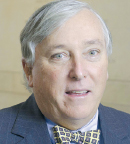Adding hydroxychloroquine, an inhibitor of autophagy, to neoadjuvant chemotherapy for pancreatic cancer increases its efficacy and alters the tumor’s molecular profile in a way that may render the tumor more susceptible to immune checkpoint inhibitors, according to interim data from a phase II randomized controlled trial.1

The final steps in autophagy can be inhibited by hydroxychloroquine. We found this to be of particular importance because autophagy has been found to be upregulated in pancreatic cancer, and this … correlates with poor prognosis.— Jennifer Miller-Ocuin, MD
Tweet this quote
“During times of cellular stress, cells may undergo programmed apoptotic cell death or, alternatively, they may undergo autophagy, which is the process of recycling damaged materials to promote programmed cell survival,” first author Jennifer Miller-Ocuin, MD, explained to attendees of a plenary session at the Society of Surgical Oncology’s Annual Cancer Symposium.
“The final steps in autophagy can be inhibited by the drug hydroxychloroquine,” she said. “We found this to be of particular importance because autophagy has been found to be upregulated in pancreatic cancer, and this…correlates with poor prognosis.”
Key Findings
Among the 54 patients included in interim analyses, those given hydroxychloroquine—currently used as an antimalarial agent and disease-modifying antirheumatic drug—had a significantly greater response to chemotherapy, whether it was assessed with histopathologic or biochemical criteria. They also had fewer positive lymph nodes at the time of surgery.
Additionally, patients in the hydroxychloroquine group more often had favorable changes in molecular features, including greater tumor T-cell infiltration and greater expression of the programmed cell death ligand 1 (PD-L1), a molecule active at an immune checkpoint for which several therapeutic inhibitors are available.
“Autophagy inhibition, in addition to preoperative gemcitabine and nab-paclitaxel (Abraxane), improves histopathologic response as well as biochemical response in resectable pancreatic cancer,” summarized Dr. Miller-Ocuin, who is a general surgery resident and postdoctoral fellow at the University of Pittsburgh. “Furthermore, our corollary studies suggest decreased stromal activation, increased immune infiltration, and increased T-cell exhaustion markers in the presence of hydroxychloroquine.”
The trial’s findings have led to genesis of a new randomized phase II trial enrolling similar patients, all of whom will receive the same chemotherapy plus hydroxychloroquine, either with or without the immune checkpoint inhibitor nivolumab (Opdivo), she noted.
Effect on Radiation Therapy

Daniel G. Coit, MD
Session moderator Daniel G. Coit, MD, a surgical oncologist at the Memorial Sloan Kettering Cancer Center in New York, noted that radiation therapy is often used in patients with borderline-resectable pancreatic cancer. “Do you know how hydroxychloroquine might potentiate radiation effect as well?” he asked.
“We did not examine that in this trial specifically, but I do think it’s an excellent question,” Dr. Miller-Ocuin replied. “We were looking to identify primarily a change in the biologic response in these patients, and while it may not have led to a significantly higher R0 resection rate, that wasn’t necessarily what we were trying to identify. We wanted to have resection specimens to use for our corollary studies, looking for a biologic signal to show where we should go next in this trial.”
Study Details
All 81 patients randomized in the trial had potentially resectable pancreatic adenocarcinoma and received 2 months of neoadjuvant gemcitabine plus nab-paclitaxel chemotherapy, with or without oral hydroxychloroquine (600 mg twice daily). “Importantly, there was no difference in the number of doses of chemotherapy received between the two arms of this trial,” Dr. Miller-Ocuin noted.
Interim efficacy results for 54 patients showed that the Evans grade histopathologic response (percentage of tumor destroyed; see sidebar) assessed by a blinded pathologist—the trial’s primary endpoint—was better in the hydroxychloroquine group (P = .004). Specifically, patients in that group had lower rates of grade I response (11.5% vs 37%) or grade IIa response (34.6%, vs 51.9%), and higher rates of grade IIB response (34.6% vs 11.1%) and grade III response (19.2% vs 0%).
EVANS FOUR-TIERED GRADING SYSTEM (PERCENTAGE OF TUMOR DESTROYED)
- Grade I, little (< 10%) or no tumor cell destruction
- Grade IIa, 10%–50% of tumor cells destroyed
- Grade IIb, 51%–90% of tumor cells destroyed
- Grade III, few (< 10%) tumor cells appear to be viable
- Grade IV, no viable tumor cells
The hydroxychloroquine group also had a greater response, as defined by change in the level of the biomarker cancer antigen 19-9, with a mean reduction of roughly 20% compared with 10% (P = .014).
At the time of surgery, the ratio of positive lymph nodes to total number of lymph nodes was lower in the hydroxychloroquine group vs the control group (0.03 vs 0.05; P = .002). However, the rate of margin-negative (R0) resection did not differ significantly between groups (81.5% vs 66.7%; P =. 13).
Molecular assessments showed that the hydroxychloroquine group had greater apoptosis in their tumors (consistent with inhibition of autophagy), less stromal activation indicated by sparser smooth muscle actin expression, greater infiltration of CD4 and CD8 T cells (P = .016 and P = .046, respectively), and greater tumor expression of PD-L1.
Serious adverse events did not differ significantly between groups, with 14 grade 3 to 5 events reported in each arm, according to Dr. Miller-Ocuin.
“We do acknowledge some limitations of the study, including a small sample size, being underpowered for survival, and no placebo control,” she noted. ■
Disclosure: Drs. Miller-Ocuin and Coit reported no conflicts of interest.
Reference

